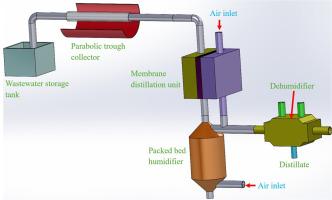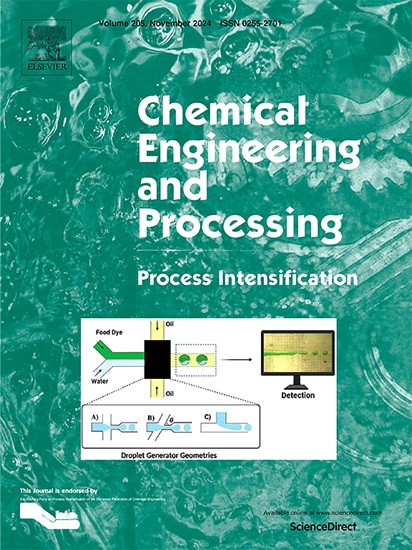The potential of integrating solar-powered membrane distillation with a humidification–dehumidification system to recover potable water from textile wastewater
IF 3.8
3区 工程技术
Q3 ENERGY & FUELS
Chemical Engineering and Processing - Process Intensification
Pub Date : 2024-11-01
DOI:10.1016/j.cep.2024.110036
引用次数: 0
Abstract
Textile production is energy- and water-intensive, and membrane distillation (MD) has shown potential for reclaiming potable water from textile wastewater. However, in the current state, the energy and water recovery potential of MD is lower compared to other conventional distillation technologies. To address these issues, this study proposes and assesses a novel solar-powered hybrid Sweeping Gas MD (SGMD) unit integrated with a humidification dehumidification (HDH) system. Real textile wastewater from bleaching and dyeing processes is treated in the hybrid SGMD-HDH system to recover freshwater. An optical-thermal sub-model for the parabolic trough collector and the heat and mass transfer model for the dehumidifier are developed and validated using experimental measurements. The results reveal that the hybrid SGMD-HDH can exhibit nearly 20 % higher water flux and 50 % higher gain output ratio (GOR) compared to the standalone MD system. The highest water production and average GOR for bleaching wastewater feed solution reached 11.72 kg/day and 0.64, respectively. The higher concentration of chemical contaminants in dyeing wastewater decreased water flux and GOR by up to 14 % and 10 %, respectively, compared to bleaching wastewater. Elemental analysis showed increased carbon concentrations on the polytetrafluoroethylene membrane surface arising from organic fouling.

将太阳能膜蒸馏与加湿-除湿系统结合起来从纺织废水中回收饮用水的潜力
纺织生产是能源和水密集型行业,膜蒸馏(MD)已显示出从纺织废水中回收饮用水的潜力。然而,与其他传统蒸馏技术相比,膜蒸馏的能源和水回收潜力较低。为解决这些问题,本研究提出并评估了一种新型太阳能混合扫气 MD(SGMD)装置,该装置与加湿除湿(HDH)系统集成。在 SGMD-HDH 混合系统中处理来自漂染工艺的真实纺织废水,以回收淡水。开发了抛物面槽式集热器的光热子模型和除湿器的传热传质模型,并通过实验测量进行了验证。结果表明,与独立的抛物面槽集热器系统相比,SGMD-HDH 混合系统的水通量高出近 20%,增益输出比(GOR)高出 50%。漂白废水进料溶液的最高产水量和平均 GOR 分别达到 11.72 公斤/天和 0.64。与漂白废水相比,染色废水中较高浓度的化学污染物使水通量和 GOR 分别降低了 14% 和 10%。元素分析表明,有机污垢导致聚四氟乙烯膜表面的碳浓度增加。
本文章由计算机程序翻译,如有差异,请以英文原文为准。
求助全文
约1分钟内获得全文
求助全文
来源期刊
CiteScore
7.80
自引率
9.30%
发文量
408
审稿时长
49 days
期刊介绍:
Chemical Engineering and Processing: Process Intensification is intended for practicing researchers in industry and academia, working in the field of Process Engineering and related to the subject of Process Intensification.Articles published in the Journal demonstrate how novel discoveries, developments and theories in the field of Process Engineering and in particular Process Intensification may be used for analysis and design of innovative equipment and processing methods with substantially improved sustainability, efficiency and environmental performance.

 求助内容:
求助内容: 应助结果提醒方式:
应助结果提醒方式:


